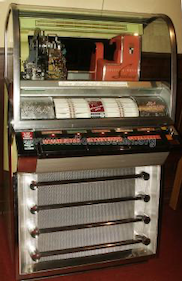To get to know my wife I needed to understand the many pithy metaphors and sayings familiar to Texans but were incomprehensible to an Englishman. I quickly realised it was easier to learn when to say them than it was to find out what they meant. I became adept at punctuating a conversation with these sayings without much idea of what I was talking about. I was particularly intrigued when Penny said “grandpa Pappy Chick bought the farm.” This didn’t mean the old man had gone into real estate. No, it meant he had died.
I now knew what it meant, but I really didn’t understand it. Given that Texans were, until recently frontier people, I assumed that dying could be compared to the ultimate retirement which for a Texan must be like owning a ranch in heaven.
Just today I discovered the origin of the expression and that my dcoding of the metaphor was wrong. According to Walker Percy’s fascinating book, The Message in the Bottle,1 ‘bought the farm’ was used by U.S. solders in the Korean War to refer to about six feet of ground reserved for each of their fallen comrades.
Although this example is of personal interest, in a chapter entitled ‘Metaphor as Mistake’ Percy says it has a much wider significance. Although I made a ‘mistake’ in my assumptions about the meaning of the expression, I had in fact been engaged in a creative act, and by thinking about the subject (of death) in a new way I now knew it better.
Percy maintains that this kind of “accidental blundering into authentic poetic experience” may be an ‘error’ but it is also an “act of symbolization, [which] is itself the instrument of knowing and is an error only if we do not appreciate its intentional character. If we do not take note of it, or if we try to exorcise it as a primitive residue.” (pp. 81-82)2
 Percy gives several examples where a ‘mistaken’ version has a richness that exceeds the ‘right’ version. He notes that “In Mississippi, coin record players, which are manufactured by Seeburg, are commonly known to Negros as seabirds.” (p. 64) While it is interesting to note how ‘acceptable’ language has changed since the ’60s, his point is that the ‘error’ of thinking of a jukebox as a seabird produces all sorts of unexpected images, associations and feelings. He also maintains that for this metaphor to be in common use in a community it must strike a cord at some deep out-of-awareness level in the collective psyche. He is saying that labels and names that have a long history or wide acceptance are not arbitrary – especially when they have occurred by ‘accident’.3
Percy gives several examples where a ‘mistaken’ version has a richness that exceeds the ‘right’ version. He notes that “In Mississippi, coin record players, which are manufactured by Seeburg, are commonly known to Negros as seabirds.” (p. 64) While it is interesting to note how ‘acceptable’ language has changed since the ’60s, his point is that the ‘error’ of thinking of a jukebox as a seabird produces all sorts of unexpected images, associations and feelings. He also maintains that for this metaphor to be in common use in a community it must strike a cord at some deep out-of-awareness level in the collective psyche. He is saying that labels and names that have a long history or wide acceptance are not arbitrary – especially when they have occurred by ‘accident’.3
Percy refers to such ‘mistakes’ as revealing “a secret knowing” of which we were unaware. By naming this knowing in word or thought we acknowledge to ourselves that we know something extra about the phenomenon in question and that is, in some mysterious way, self-validating.
This reminds me that David Grove was fascinated by what he called “mishearing” (either by or client). Mishearing is a sort of auditory equivalent of a slip of the tongue – a slip of the ear? Percy points out4 that the effect of misnaming, misunderstanding or misremembering can heighten a sense of being. Grove’s interest stemmed from the new possibilities that these ‘errors’ created. He loved puns and would often ‘mispronounce’ or mumble a word or phrase so as to accentuate an ambiguity.5
This love of ambiguity led Grove to make sure that where ever he worked there were plenty of dictionaries, encyclopaedia and other books where clients could research the multiple meanings, etymology and science of particular words or phrases they had used during a session.
I remember as a client of Grove’s being tasked with one such assignment and being stunned to realise that some English words have 30 meanings. In that moment I saw how my hurt due to being misunderstood was only possible if I think they should or even could know what I mean. And that I could know what the other person’s interpretation of my words meant for them. If I accept that I, and they, are inevitably misconstruing, then I am more likely, as Stephen Covey says, to seek to understand before I seek to be understood.6
Sometimes Grove suggesting looking up a highly idiosyncratic word, at other times he picked an apparently common word. Sometimes a client would have repeated the word many times; on another occasion they would have said it just once in passing. It was often hard to discern any pattern to Grove’s choice of words he picked. He would say “it just felt right”. No doubt his vast therapeutic experience and deep knowledge of the symbolic domain informed his intuitions.
Notes
1 My thanks to Michael Mallows who loaned me the book by Walker Percy, The Message in the Bottle: How Queer Man Is, How Queer Language Is, and What One Has To Do With The Other, Farrar, Straus and Giroux, 1979.
2 Percy repeatedly uses phrases like “accidental blundering” and “stumbling upon” to refer the process of unintended discovery of metaphor. These words are the hallmark of serendipity which forms a central feature of Symbolic Modelling. See Penny Tompkins’ and my article, Maximising Serendipity.
3 For more on the congruence between many words and their embodied action, see my blog Verbal dynamics.
4 I assure you that my reference to ‘Percy pointing’ was unintentional. Perhaps some readers will not be familiar with the English use of such euphemisms as: ‘I’m off to point Percy at the porcelain.’
5 Ambiguous comes from the Latin meaning ‘to drive both ways’ and David would often use the icon of Janus the Roman god that had two faces so he could look both ways simultaneously. But even David had his limits. He acknowledged that he had overextended himself when a client said she “felt free to lay down” and he tried to slip in a pun related to the corn chip company Frito-Lay! It didn’t work to well, but you have to give him 10 out of 10 for trying.
6 Stephen R Covey, The 7 Habits of Highly Effective People. Habit 5: Seek first to understand, Then to be understood.







